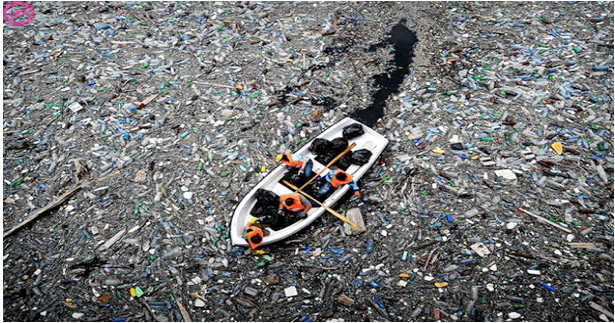WELLNESS--From dangerous chemicals leached out of water bottles to fish feeding on them in the oceans, plastics have been plaguing our oceans and environment and the problem is only getting worse. (Photo above: plastic patch in the Pacific.)
In a new study published in Science they found that certain fish larvae exposed to plastic particulates are eating and feeding on them. While plastic is not biodegradable, is does degrade into smaller sized micro plastics that are edible by small fish larvae. Even more disturbing is that they continued to eat the plastic particulates and choose plastic over real food. The scientists speculate that there is a chemical compound in the plastic that tricks the brain of the fish larvae causing them to stuff themselves with the small plastic particles. One of the scientists in the study was quoted as saying "I remember looking at them under the microscope and just seeing so many little plastic pieces in their stomachs, fish after fish. It was terrifying."
After these larvae have been eating plastic for long enough their behavior changes and they become less likely to spot and avoid prey along with changes in their eating habits. Along with these changes comes a notable decrease in the hatching of new larvae. Larger fish eat smaller fish and we eat larger fish, so we have already been consuming plastic via fish for a number of years.
The great Pacific garbage patch is a massive area in the ocean that has been growing for years. From north America to Japan there are two vortexes of trash, each one roughly the size of Texas that are comprised mostly of plastics. The plastic breaks down into tiny particles called microplastics that are not be easy for us to see, but they are easy for the fish to eat. Because they are not biodegradable, the small fish mistake them for food, and the larger fish consume the smaller fish and humans then consume the larger fish.
These plastics are coming primarily from North America and Asia. A big chunk of the plastics come from boaters and cargo ships that are dumping trash. Plastic fishnets are the other culprits of plastic waste in the trash. North America is slowly adopting bans on plastic bans city-by-city and state-by-state. Some countries in Europe have banned plastic bans or put a price on them since the early 2000’s. Both have a powerful impact on cutting down on plastic pollution.
To find out the status of plastic bag bans in your state check out www.bagtheban.com. You can put in your state or zip code of your city to see if and when a ban of plastic bags will go into effect in your city. If there is no ban the site also gives you the option to take action and start a ban in your hometown. More and more people are waking up to the dangers of plastics and within the next 4 years or so most cities and states will adopt a ban on plastic bags.
(Christian Cristiano is an acupuncturist in LA, TV host of Wellness for Realists and writes on wellness regularly for CityWatch. Christian can be reached at 323.935.3420. twitter: @CristianoWFR)
-cw
